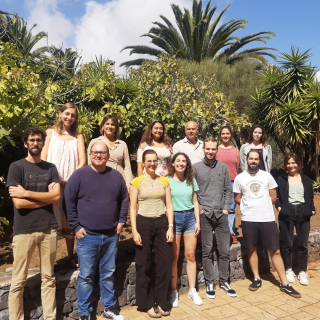Bibcode
López-Sanjuan, C.; Le Fèvre, O.; Ilbert, O.; Tasca, L. A. M.; Bridge, C.; Cucciati, O.; Kampczyk, P.; Pozzetti, L.; Xu, C. K.; Carollo, C. M.; Contini, T.; Kneib, J.-P.; Lilly, S. J.; Mainieri, V.; Renzini, A.; Sanders, D.; Scodeggio, M.; Scoville, N. Z.; Taniguchi, Y.; Zamorani, G.; Aussel, H.; Bardelli, S.; Bolzonella, M.; Bongiorno, A.; Capak, P.; Caputi, K.; de la Torre, S.; de Ravel, L.; Franzetti, P.; Garilli, B.; Iovino, A.; Knobel, C.; Kovač, K.; Lamareille, F.; Le Borgne, J.-F.; Le Brun, V.; Le Floc'h, E.; Maier, C.; McCracken, H. J.; Mignoli, M.; Pelló, R.; Peng, Y.; Pérez-Montero, E.; Presotto, V.; Ricciardelli, E.; Salvato, M.; Silverman, J. D.; Tanaka, M.; Tresse, L.; Vergani, D.; Zucca, E.; Barnes, L.; Bordoloi, R.; Cappi, A.; Cimatti, A.; Coppa, G.; Koekemoer, A.; Liu, C. T.; Moresco, M.; Nair, P.; Oesch, P.; Schawinski, K.; Welikala, N.
Referencia bibliográfica
Astronomy and Astrophysics, Volume 548, id.A7, 18 pp.
Fecha de publicación:
12
2012
Revista
Número de citas
141
Número de citas referidas
135
Descripción
Aims: The role of galaxy mergers in massive galaxy evolution, and
in particular to mass assembly and size growth, remains an open
question. In this paper we measure the merger fraction and rate, both
minor and major, of massive early-type galaxies (M ⋆
≥ 1011 M&sun;) in the COSMOS field, and study
their role in mass and size evolution. Methods: We used the
30-band photometric catalogue in COSMOS, complemented with the
spectroscopy of the zCOSMOS survey, to define close pairs with a
separation on the sky plane 10 h-1 kpc ≤ rp
≤ 30 h-1 kpc and a relative velocity Δv ≤ 500 km
s-1 in redshift space. We measured both major (stellar mass
ratio μ ≡ M ⋆ ,2/M ⋆ ,1 ≥
1/4) and minor (1/10 ≤ μ < 1/4) merger fractions of massive
galaxies, and studied their dependence on redshift and on morphology
(early types vs. late types). Results: The merger fraction and
rate of massive galaxies evolves as a power-law (1 + z)n,
with major mergers increasing with redshift, nMM = 1.4, and
minor mergers showing little evolution, nmm ~ 0. When split
by their morphology, the minor merger fraction for early-type galaxies
(ETGs) is higher by a factor of three than that for late-type galaxies
(LTGs), and both are nearly constant with redshift. The fraction of
major mergers for massive LTGs evolves faster
(nMMLT ~ 4 ) than for ETGs
(nMMET= 1.8). Conclusions: Our results show
that massive ETGs have undergone 0.89 mergers (0.43 major and 0.46
minor) since z ~ 1, leading to a mass growth of ~30%. We find that μ
≥ 1/10 mergers can explain ~55% of the observed size evolution of
these galaxies since z ~ 1. Another ~20% is due to the progenitor bias
(younger galaxies are more extended) and we estimate that very minor
mergers (μ < 1/10) could contribute with an extra ~20%. The
remaining ~5% should come from other processes (e.g., adiabatic
expansion or observational effects). This picture also reproduces the
mass growth and the velocity dispersion evolution of these galaxies. We
conclude from these results, and after exploring all the possible
uncertainties in our picture, that merging is the main contributor to
the size evolution of massive ETGs at z ≲ 1, accounting for ~50-75%
of that evolution in the last 8 Gyr. Nearly half of the evolution due to
mergers is related to minor (μ < 1/4) events.
Based on observations made at the European Southern Observatory (ESO)
Very Large Telescope (VLT) under Large Program 175.A-0839.
Proyectos relacionados

Huellas de la Formación de las Galaxias: Poblaciones estelares, Dinámica y Morfología
Bienvenida a la página web del g rupo de investigación Traces of Galaxy Formation. Somos un grupo de investigación amplio, diverso y muy activo cuyo objetivo principal es entender la formación de galaxias en el Universo de una manera lo más completa posible. Con el estudio detellado de las poblaciones estelares como bandera, estamos constantemente
Anna
Ferré Mateu